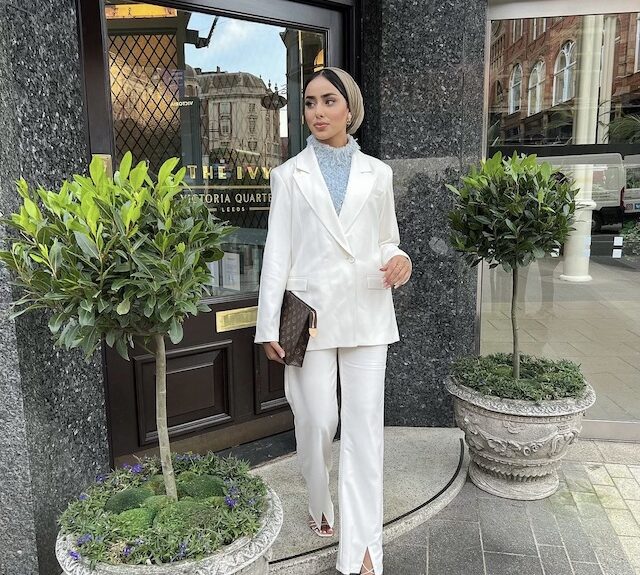Fashion Lifestyle & Culture Religion
Self-styled, self-defined Muslim women
By Liyana Illyas
Djenabou Diallo’s loose blue jeans were paired with a long-sleeve, flowy white shirt and a cornflower blue hijab.
Mariam Sayeed wore her cream-colored, three-quarter-length sleeved T-shirt with blue jeans and a periwinkle colored hijab.
Both are Muslim, dressed to reflect their religious beliefs that women should be more covered up in public, even on a hot summer day in the heart of Manhattan’s Washington Square Park.
Clothing may be an important part of one’s identity, Sayeed, 27, said. But it’s not all that a person is.
In addition to being a Muslim woman who dresses in accordance with her faith, she has several other roles. “I’m constantly thinking about my work and how it impacts the communities around me,” said Sayeed, during a recent visit to New York from Washington, D.C., where she works for the United Nations.
Muslim women, she added, are not so different from other women. Many, like her, focus on their hobbies, having fun and expressing themselves in ways that have nothing to do with their clothes.
But their clothes can confuse others, including people who make unfounded presumptions about those women and what their clothes convey.
Once, Sayeed said, at a beach, a woman straight-out insulted her: “Before I started wearing a hijab, I wore a T-shirt and leggings to the beach, and some woman came up to me and was like, “‘You’re so free and independent. You don’t care what anybody thinks of you, you remind me of my eight-year-old daughter’”… It just seems so baffling to me that she thought it was so courageous of me to wear leggings at a beach.”
She continued: “People are constantly making comments about if you’re wearing the hijab properly or not, or if you’re showing some hair, or if you’re showing too much hair, or if you’re showing too little hair.”
Some of the unsolicited criticisms from Muslims and non-Muslims result from women merely being women, she added: “There’s always judgment on women regardless of your background … It’s just kind of a patriarchal society, overall, in general.”
Muslims and non-Muslims alike sometimes pressure Muslim women to either wear more clothes or fewer clothes, depending on their point-of-view, said Diallo, 18, an NYU biology major.
“It’s like you have two different voices talking to you,” she said, referring how, for example, the opinions of her non-Muslim physical education teachers at Manhattan’s Central Park East High School and her fellow Muslims clash. “‘Oh you should be able to dress how you want, show your body,’” she said, repeating her teachers’ comments.
But once, when she wore a dress that showed a bit of her ankle to an Islamic event, she felt was being stared at. “You can feel the judgment seeping from their eyes,” she said.
Rida Ali, 21, the former president of NYU’s Muslim Student Association, said that clothes, in addition to reflecting religiosity, also express identity and individualism. Her ability “to have conversations with people about [her] faith and what that looks like in the society we live in and…being in a space where [her] viewpoints are challenged,” allows her to feel confident in why she chooses to dress how she wants. “I am strong in my choice. I know why I’m doing this… living in such a diverse society of having to talk to people [allows you] to do your research.”
Choosing to dress modestly also can signal to others why a devout Muslim woman’s choice of clothing is more that just a matter of religion, said Ali, speaking over Zoom while traveling for fun in Spain. “In a lot of the Western world, liberation and freedom is attached to removing clothing and showing your body.” She added that people have made her “feel like it’s abnormal to choose to cover up.”
Yet, instead of being annoyed by unsolicited comments or stares, she tries to take that opportunity to engage others about why she chooses to dress as she does.
“It’s always a really good opportunity for me to change people’s perceptions about Islam,” Ali said, “because the more that I’ve gone out wearing hijab … the more questions I get and the more people are sometimes surprised when I say something in class about how I don’t think it’s okay to discriminate against the LGBTQ+ community or I don’t think it’s okay for women to not have access to abortion … Just because I wear a hijab doesn’t mean I’m some fundamentalist. I have my own viewpoints for certain reasons.”
Muslim fashion blogger Rufaida Alkylani, 20, a nursing student in Alberta, Canada, said she has “found safety and security in [her] outfits,” which, for example, include attire that covers her from her shoulders down to her shins, her neckline to her wrists.
“I felt free in the sense that people couldn’t comment about the way my body looks and what I choose to wear,” she says.
She agrees that opposing views on the way she dresses is difficult to manage. “On one side of the spectrum, some Muslims view hijab & modest clothing to somewhat be limiting and backwards, while on the other side you’ll find people that think even wearing pants is immodest … This puts a lot of pressure on girls to dress a certain way and feel like they’re never doing enough, which is really harmful.”
Lawyer Sara Iftekhar, 24, is also a Muslim hijabi fashion blogger in the United Kingdom, where “women dressing conservatively isn’t a norm here.” Following the Muslim rules of modest dressing reflects self-confidence, she said. “You are in charge of your life, so do what you want.”
As Iftekhar says, “Modesty is shown in the way you speak, the way you act, the way you present yourself,” conveying the message that clothing really is more than just clothing.


